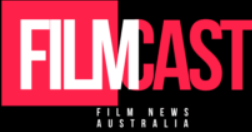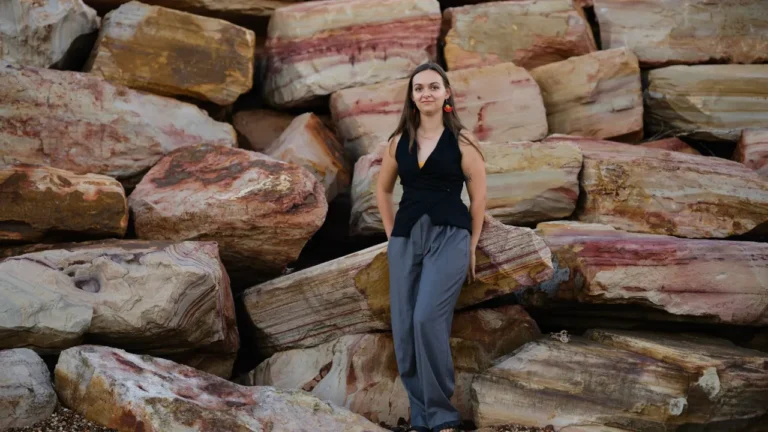[ad_1]
For Western Australian producer Brooke Collard, it was an unconventional foray into film.
Despite being drawn to film from a young age, she didn’t see the screen industry as a career pathway for a youngster from regional Western Australia. It wasn’t until Brooke randomly took a ‘what degree suits your personality’ quiz, which registered ‘film and sound’ as a compatible career, that she set upon a path in screen production.
A proud Ballardong/Whadjuk Noongar woman and mother of a toddler son, Brooke’s vision for screen was reinvigorated last month (March) when she was announced as a recipient of Screenwest’s Producer Talent Accelerator initiative for early to mid-career WA producers, receiving $100,000 towards professional development and her slate of projects.
As a producer and writer, she’s passionate about authentic representation of those who have been marginalised in media, including First Nations people and LGBTQIA+.
Growing up, did you always want to be a filmmaker? How did you find yourself in the industry?
I’ve always been drawn to films and the art of film making. When I was little, I always watched the behind-the-scenes of films. My favourite was always Brother Bear where they showed the BTS for Foley. They brought in an actual baby bear to record its sounds!
Being a regional kid growing up in Margaret River I didn’t see film as a pathway. It was not until I had to decide what I was going to study, and feeling overwhelmed by all the choices, that Murdoch University offered a ‘what degree suits your personality’ quiz. I got film and sound, and ended up here!
Of course, I used to watch a lot of YouTubers as a teenager and mostly started by making my own vlogs. Imagine if I’d continued, I could have been a millionaire by now!
Once I graduated from university, my real first step into the film industry was through Devina McPherson (Bran Nue Dae, The Heights) when she worked at Screenwest. She really took me under her wing and helped me with some attachments to projects.
What kind of storytelling do you enjoy most? What are the most important stories on your radar?
My favourite kind of stories are ones that help to believe the best of humanity in dark times. I adore Amelie and I loved Sweet Tooth as they’re perfect examples of this. I’ve also been reading a lot, and I love stories that dive into First Nations spirituality. My favourite book I read last year was Split Tooth for this exact reason.

How is screen storytelling important for First Nations communities?
It’s important to see ourselves and our communities represented on screen. Not just for ourselves, but also to dismantle wider perceptions of First Nations peoples. I’d love to see more representations of our cheekiness in the future.
You’ve just been announced as a successful recipient of Screenwest’s Producer Talent Accelerator initiative, giving you $100,000 towards professional development and your slate of projects. What are you planning?
It’s honestly such a dream come true! I’m hoping to use it to network with international companies and begin to understand international audiences a lot more. I’m also looking at producer attachment opportunities with some production companies. A big focus of mine is also is looking at ethical sustainability for film businesses – I’d love to grow my company to a point that we can support First Nations and LGBTQIA+ projects.
You’ve covered a lot of ground in a relatively short time. How have you managed to successfully pivot to different screen projects and mediums? (i.e. Film, podcast, games)
Honestly, I would say it’s because I’m curious about everything, especially anything in the creative tech world. It also helps that sometimes projects that might be too small to be film, can be made as a podcast. Games is a natural pathway for a lot of writers, and can be a fun challenge when you have to write multiple pathway storytelling, then code that into a program. At the heart of it all really, is just being passionate about storytelling and following the best medium for each story.
Tell us what you’re doing in the digital games space at the moment?
Currently I’m working with Benjamin Armstrong to create a digital game called Buru & The Old People. It’s a digital game exploring racism through the displacement of ibis, but throwing in some Dungeons and Dragons.
What have been your biggest career influences?
I call them my ‘Film Aunties’. I’m always looking up to people such as Jodie Bell (Putuparri and the Rainmakers, Doug the Human, The Lost Crystals of Jessica’s Room), who actively promotes not having to move from the country to the city in order to have a career in the film industry.
I also admire Jub Clerc (The Turning, Sweet As, Mystery Road: Origin) as I love her attitude to working in the industry and sticking to her beliefs while advocating for what is right.
What advice would you give emerging First Nations filmmakers?
Reach out to filmmakers and funding bodies to make them aware that you’re around. Especially for entry level jobs, such as notetaking, people are looking to hire First Nations people as much as they can. Network or have virtual coffees at least once a month to discuss projects. But most of all get a strong support network around you, especially if that can be other First Nations film makers.
What’s your favourite place or film location in WA?
I’m really wanting to film out in the Wheatbelt in WA. Just imagine how gorgeous Katta Kich (Wave Rock) would look on film!
What are you currently working on? What’s next for Brooke Collard?
Too many things! I’ve got quite a few things in development, such as a VR, two short films, a couple feature films. But to be honest, I’m just really excited to stay home for a little bit and grow a veggie patch while enjoying the dry season in Broome.
[ad_2]
Source link

